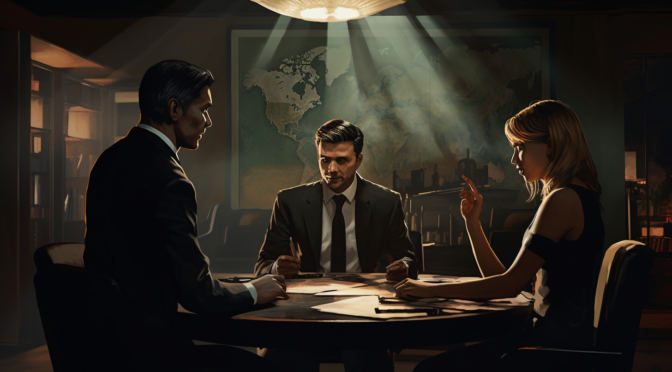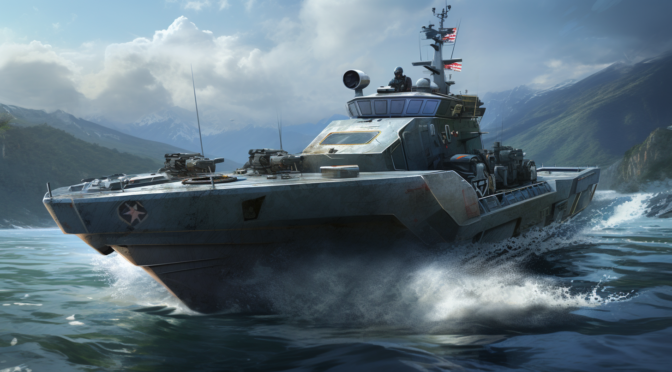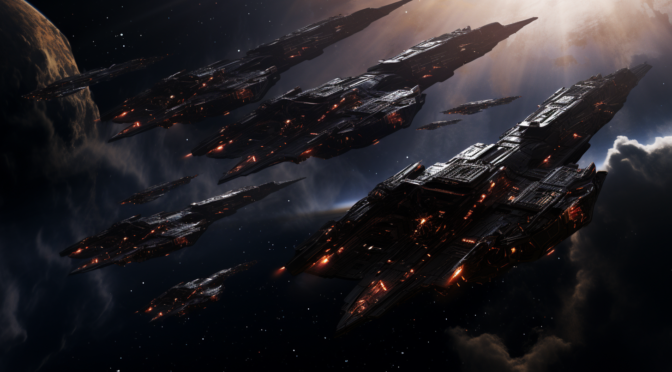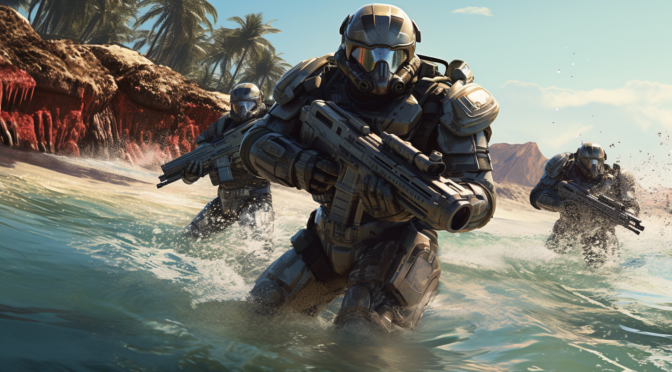By David Strachan
Exhibit B-3
Search Warrant Interview
VERBATIM TRANSCRIPTION
Date of Recording: April 25, 2025
Participants:
SAQ: Special Agent Daniel J. Quinn
SAY: Special Agent Marina R. Yarbrough
CAO: Charles Alan Ordway
_________________________________________
SAQ: Charles Alan Ordway?
CAO: Yes.
SAQ: Good morning, sir. I’m Special Agent Daniel Quinn with the Federal Bureau of Investigation. This is my partner, Special Agent Marina Yarbrough.
SAY: Good morning.
CAO: Morning.
SAQ: We’re here today because we have a warrant to search your home.
CAO: Oh?
SAQ: Do you have any idea what this might be about?
CAO: Um, I – no, I have no idea.
SAQ: Okay, well, so, this is about the unauthorized transmission of classified information.
[Pause]
CAO: Okay.
SAQ: Uh, so we’d like to sit down and talk to you about this, go over exactly why we’re here, and you can tell us your side of things. It’s completely voluntary to talk with us. If you prefer, we can go down to the field office –
CAO: No, I – here’s fine, I guess. I mean – I’ll cooperate. Whatever you need.
SAQ: Good, that’s – we really appreciate that, sir. Okay, so – is there a place we can all sit down together?
CAO: Uh, sure. I guess the dining room.
[Pause]
[Noises]
CAO: Sorry for the mess. Not sure why we call it the dining room when we haven’t eaten a single meal in here since, I don’t know, 2004.
[Laughter]
SAQ: Not a problem. We just need someplace to sit. Is there anyone else at home?
CAO: Uh, no. My wife’s at work, my kids are away at college.
SAQ: Okay, and, um, any weapons in the home? Anything we should be concerned about?
CAO: Well, I mean – the kitchen has knives. There’s scissors in the desk drawer –
SAQ: [Laughs] Yeah, that’s okay. I think we’re probably fine. Marina’s just going to take a look around, though, okay?
CAO: Sure, fine.
SAQ: Great. Okay, so, as I mentioned we have a search warrant here, and there are some other folks who are going to be helping us with that momentarily. But, um, in the meantime you’re welcome to read it, and we can go over it, and you can feel free to ask questions. And then also, if you’re willing to talk to us, so we can, you know, sort all this out.
CAO: Of course. Sure.
SAQ: Okay, great. So, let me – I’m going to ask you some questions, okay? And again, this is all voluntary.
CAO: Sure, I understand.
SAQ: Okay, so, Mr. Ordway –
CAO: You can call me Charlie. I hear Mr. Ordway and I start looking for my dad.
SAQ: [Laughs] Okay, sure. So, Charlie, you’re currently employed at FathomWorks in Arlington, Virginia, is that correct?
CAO: Yes, that’s correct.
SAQ: You’re a senior director there – is that correct? Of autonomous systems?
CAO: Yes, that’s correct.
SAQ: And what kind of work do you do?
CAO: Um, well, I guess generally speaking I’m a marine robotics engineer. I manage a group of about thirty people working on a project related to undersea warfare.
SAQ: Okay, and – actually, could you be more specific for me?
CAO: Well, I could, but then I’d have to kill you.
SAQ: [Laughs] It’s okay. You can speak freely. I actually know more than you probably think.
CAO: Well, that certainly sounds – ominous. [Laughs] I guess I’ll have to take your word for it on that. Uh, well, so my group works on the development of undersea systems for the U.S. Navy. Specifically, systems that integrate AUVs – autonomous underwater vehicles – into offensive mine warfare platforms.
SAQ: I see, and would that be, um, Autonomous Undersea Denial Networks?
CAO: Yes, that’s what the Navy’s calling them – AUDENs, actually. Yet another acronym to remember.
SAQ: [Laughs] Always with the acronyms. So, can you explain to me what exactly an AUDEN is and how it works?
CAO: Hmm, okay, well, in a nutshell, imagine mines that can think, move, work together, and decide when, where, and who to strike. And now imagine that you can deploy them covertly, for months, to any ocean in the world. That’s an AUDEN.
SAQ: Okay, uh, wow – that sounds very impressive. And complex. And so do you work on a particular aspect of the program?
CAO: Yes. So, one of the biggest challenges with something like this is endurance – energy. AUVs are still using the same energy storage technology that they’ve been using for the last, oh, half a century, and that’s batteries. But the problem is – these vehicles, AUVs, they can only operate for maybe a few days before they lose their charge. So, how do you provide power to a bunch of AUVs operating in the middle of the ocean somewhere? It’s my job to solve that problem. And so we’re developing what’s basically a charging station for AUVs that sits on the seabed and enables them to patrol an area of waterspace, gather intelligence, and engage enemy targets over an extended period of time.
SAQ: I see. Okay, so, um, in addition to your colleagues at FathomWorks, you also have opportunities to interact with people working in the defense industry, both in the United States and abroad, correct?
CAO: Um, yes. I occasionally travel to conferences for professional development, networking, things like that.
SAQ: Okay, and – so two years ago, in April of 2023, you traveled to Stockholm, Sweden to attend a conference called Subsea/Seabed Tech. Is that correct?
CAO: Yes, that’s correct, SST.
SAQ: Can you describe that event?
CAO: Well, I mean, it’s heavily attended, held annually at different locations throughout the world. Pretty much your typical professional conference – an exhibit hall, technical presentations and panels on undersea warfare and SSW – Seabed and Subsea Warfare. I was there to present a paper I was publishing on LENRs – Low Energy Nuclear Reactors – and their potential for naval applications.
SAQ: Okay, and so – was it at this conference, SST, that you first encountered Henrik Lindström?
[Pause]
CAO: Uh, yes. He approached me after my presentation. He seemed very interested in the topic, and we chatted quite a bit, and so we made plans to meet later that evening for dinner.
SAQ: Okay, and, so you meet for dinner. Do you remember what you talked about?
CAO: Well, I mean, mostly it was just a lot of small talk, as I remember it.
SAQ: Did you talk about FathomWorks?
CAO: A bit, yes.
SAQ: And did Mr. Lindström talk about his work?
CAO: Yes. He mentioned that he was working at the Swedish Defence Research Agency, and that he was working in some capacity on Swedish submarine designs. But he wanted out, and was in the process of starting a small consultancy specializing in undersea warfare.
SAQ: The consultancy – that would be HL Subsea AB?
CAO: Yes, that’s correct.
SAQ: Okay. And so that evening at dinner – did he ask if you might be interested in working for him in some capacity?
CAO: Yes, he mentioned that the Swedish Navy was pursuing some interesting ideas related to mine warfare, and that given my background in marine robotics and AUVs, there might be an opportunity for some consulting work.
SAQ: And did you express any interest in this?
CAO: I told him that as long as it didn’t pose any problems or conflicts at FathomWorks, I might be interested, yes.
SAQ: Okay, so after you returned from the conference, did you continue to communicate with Mr. Lindström?
CAO: Yes, we kept in touch via e-mail at first, and eventually we began video calling.
SAQ: And during your contacts with him – did the discussion gradually turn to you becoming a paid consultant for HL Subsea?
CAO: Yes. He kept mentioning the Swedish interest in offensive mining, and that there were contracts coming, and that with me on board it had the potential to be a real revenue generator for his company.
SAQ: And so at some point you formalized your agreement?
CAO: Well, initially Henrik just asked if I could write a white paper on AUVs and unmanned systems, and how they would drive the future of mine warfare. I suppose that was my audition, more or less.
SAQ: And how much were you paid for that?
CAO: Twenty-five hundred dollars.
SAQ: And was it well received?
CAO: Very much so. Henrik was incredibly excited by it. He said that it touched on many of the concepts and ideas that were on Sweden’s wish list, but that they lacked the technical know-how to bring it into reality. And that’s where I could really help his company, he said – by providing technical expertise which they in turn could use to win contracts with the Swedish Navy.
SAQ: So, then – did the success of the white paper lead Mr. Lindström to propose a formal consulting agreement?
CAO: Yes. Within days of delivering the white paper, the contract was on my desk.
SAQ: What was the offer?
CAO: Around $10,000 a month.
SAQ: Well, that must have been quite enticing.
CAO: [Laughs] You’re talking to someone married to a preschool teacher, with a fat mortgage, and two kids in college. You’re damn right it was enticing.
SAQ: [Laughs] Okay, and – so what were the expectations, the terms, of the contract – for work product, deliverables?
CAO: It was pretty vague. Something like, I would advise HL Subsea on matters related to undersea warfare, or words to that effect.
SAQ: Nothing specific as to deliverables, though? Hours per month?
CAO: Nope. Nothing like that. It seemed, well, like easy money, really. If all he needed was an occasional white paper or some number crunching, well, then I’ll take ten K a month for that. I’m not stupid. [Laughs]
SAQ: [Laughs] And so you signed the agreement?
CAO: Without hesitation.
SAQ: Okay, so, now you have a formal agreement with Mr. Lindström’s company, HL Subsea. What were your assignments?
CAO: For the first couple months it was just answering some general e-mail inquiries about concepts of operations or certain technologies. But then Henrik started asking me pretty pointed questions about my research at FathomWorks. Initially I pushed back, politely, and he would usually back down. But after a while he became very persistent.
SAQ: And how did that make you feel?
CAO: I don’t know. I guess I felt like he was paying me all this money, and I wasn’t really doing much of anything, and I guess I felt like I needed to be producing, you know? To justify it. And to make sure it didn’t dry up. [Laughs] And Henrik – he’s a really nice guy, and he can be really charming and persuasive. He’d be like, “Look, Charlie. We’re on the same team here, right? NATO, the West? We have a common adversary, and it’s in America’s interest to ensure that the Swedes have the best technologies to defend themselves and the Baltic against Russian aggression, right?”
SAQ: And that made sense to you?
CAO: I mean, yeah, of course. I figured, you know, I’m getting paid to help a friendly nation, an ally, protect itself. So what? What harm could come from it? It’s not like I’m Johnny Walker or something. And honestly, ninety percent of security classifications – it’s just someone covering their ass. Or protecting someone’s IP.
SAQ: And so that’s when you decided to provide classified information to Mr. Lindström?
CAO: [Sighs] I – yeah, I suppose it was, yes.
SAQ: Okay, and what kind of information did you provide?
CAO: [Sighs] So, at first it was just stuff off the top of my head – expanding on the white paper with greater detail. Not just speculation, but more like a how-to, based on the R&D I was involved in.
SAQ: Was Mr. Lindström pleased with what you were providing?
CAO: Yes, and he seemed quite grateful, and I thought that would be it. But then he started making more specific requests.
SAQ: Like what exactly?
CAO: Documentation, reports, data.
SAQ: And you obliged him.
CAO: [Sighs]
[Pause]
CAO: I guess this looks bad.
SAQ: Well, I’m not going to lie, Charlie. It doesn’t look good.
[Pause]
CAO: [Sigh] You know, we’re all just mercenaries now.
[Pause]
SAQ: Uh – sorry?
CAO: My dad worked for IBM for forty five years. Forty five years, the same goddamn company. Over half his life, moving up the ladder, retiring with a full pension, health insurance. Put me and my sister through Rutgers and MIT. You think you’re going to find anything close to that today? Like hell. My LinkedIn looks like I’ve got ADD or something. You think that’s by choice?
SAQ: Oh, I – I hear you. I mean, my dad got downsized twice in three years, and a year later he had a stroke, so –
CAO: So you get it then, right?
SAQ: Sure, Charlie. I get it. The world’s changed –
CAO: And no one’s looking out for you. No one’s safe. They can pull the rug out any time they want and there’s not a damn thing you can do about it. It’s every man for himself out there. And if someone dangles a bunch of cash in your face and you’ve got a mortgage, college bills, credit cards –
[Pause]
CAO: And anyway they’re on our side, right? I mean, can you honestly say that you’d pass?
[Pause]
SAQ: [Sigh] Alright, let’s uh – let’s – Charlie, can you tell me where the HL Subsea offices are located?
[Pause]
CAO: Uh – well, I’m assuming Stockholm.
SAQ: So, then, you never actually paid them a visit.
CAO: Well, no.
SAQ: Okay. And do you recall approximately how many employees HL Subsea has?
[Pause]
CAO: Uh, no, I don’t.
[Pause]
SAQ: Okay. Charlie, once you began transmitting classified information to Mr. Lindström, what form of communication did you use?
CAO: Um, he sent me an iPhone. He said we should stick to messaging on that device. He said it was more secure.
SAQ: I see. Okay, and did you use that device – the iPhone Mr. Lindström sent you – to scan and transmit the documents?
CAO: Yes.
SAQ: And did you communicate with Mr. Lindström using that iPhone as well?
CAO: Yes.
SAQ: Okay, and did you use iMessage – the iPhone’s messaging app – when communicating with Mr. Lindström?
CAO: No, it was some other app.
SAQ: Do you remember name of the app?
CAO: Uh, no, I don’t. I never actually paid attention.
SAQ: Okay, so it’s actually called WeChat. Are you familiar with WeChat?
CAO: No. Should I be?
SAQ: It’s a Chinese messaging app.
[Pause]
CAO: I see. So, is that – I guess that’s somehow relevant here?
SAQ: [Sighs] Charlie, here’s what I’m seeing, okay? Over the course of eighteen months, HL Subsea pays you, what, a hundred eighty thousand dollars for your services, which consists primarily of transmitting sensitive and classified information. Did it ever strike you as odd that a start-up consultancy, whose main source of revenue was Swedish government contracts, was able to afford to pay you such a large sum of money?
[Pause]
CAO: Honestly, I guess I just assumed that Henrik was well-connected, well-funded, and whatever he was paying me – that was the value he placed on the information. And, sure, yeah, there were times when I felt like I was being overpaid. But, I mean, what was I supposed to do? ‘Hey, stop, you’re paying me too much.’ What kind of idiot would do that?
SAQ: [Sighs] Right, well, so, I need to tell you, Charlie, this is – you’re kind of missing the point, here. You understand that transmitting classified information, even to a U.S. ally – it’s still against the law. You do understand that, yes?
CAO: Well, I suppose technically, I mean – yeah, I get it.
SAQ: Okay, but what you also need to understand, is that this goes way beyond Sweden. Okay? It goes beyond Lindström, beyond HL Subsea.
[Pause]
CAO: Okay.
SAQ: Charlie – right now, Swedish authorities are raiding an apartment on the outskirts of Stockholm – Henrik Lindström’s apartment. Henrik Lindström is a bureaucrat working in the Swedish Defence Research Agency, just like he told you. But he’s been using his access to Swedish undersea warfare programs to pass classified information to the Chinese for nearly four years.
[Pause]
CAO: Well, I wouldn’t know anything about that.
SAQ: Maybe not, but here’s the thing, Charlie. There is no consulting business. There are no contracts with the Swedish Navy. HL Subsea is a dummy corporation created by Lindström to funnel money to his sub-agents working inside the U.S. defense industry. Probably the U.K. and European industries as well. You haven’t been working for HL Subsea, Charlie. You’ve been working for the People’s Republic of China. And by all indications, the information you’ve been providing has been incredibly valuable to them – AUDENs, subsea networks, mine warfare operations and tactics.
[Pause]
CAO: [Inaudible]
SAQ: Sorry?
CAO: I didn’t know. How was I supposed to know?
SAQ: Doesn’t matter. You got played, Charlie. And you broke the law.
[Pause]
SAQ: You still with me?
[Pause]
SAQ: You need a moment?
[Pause]
SAY: They’re here, Danny.
SAQ: Okay, thanks. Charlie, I’m ending the interview now, and we’re going to execute the search warrant.
[Pause]
CAO: [Inaudible]
[END TRANSCRIPT]
David R. Strachan is a defense analyst and founder of Strikepod Systems, a research and strategic advisory focusing on autonomous undersea systems.
Featured Image: Art created with Midjourney AI.




